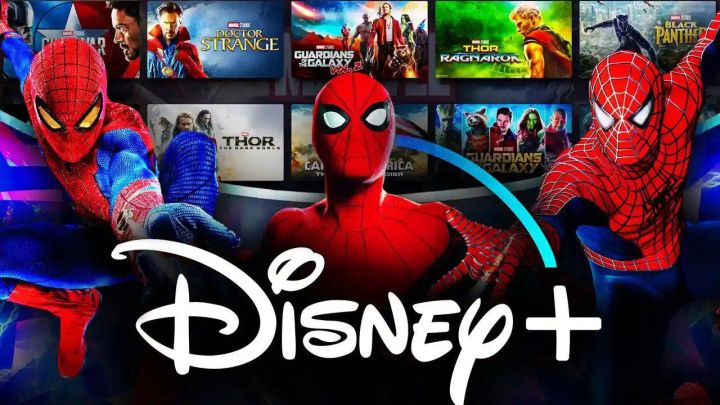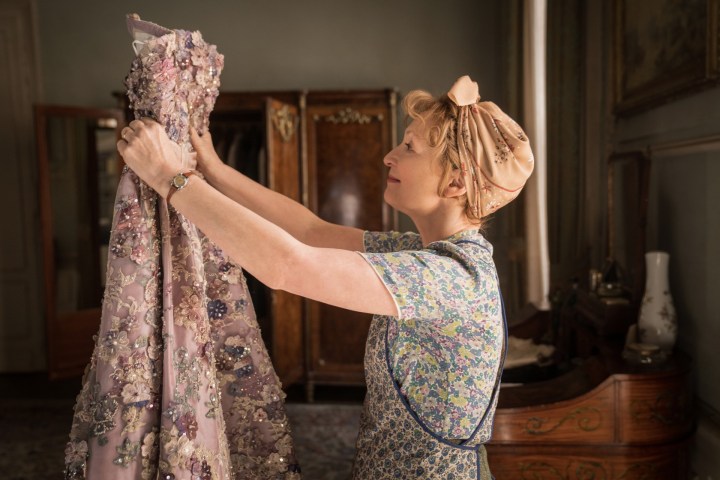Last month, Mrs. Harris Goes to Paris premiered to near-universal acclaim from critics and audiences; those that actually went to the theater to see it, anyway. Starring Academy Award nominees Leslie Manville and Isabelle Huppert, the surprisingly bittersweet movie follows a widowed cleaning lady who travels to Paris to purchase a dress from the prestigious but struggling luxury fashion house of Dior.
Mrs. Harris Goes to Paris is the third film adaptation of the 1958 novel Mrs. Arris Goes to Paris, but the charm is still there. The formula works, mainly thanks to the luminous and undeterred performance from the mighty Leslie Manville, one of her generation’s most underrated actresses. Yet, despite its overflow of enchanting entertainment, the film failed to register at the box office; indeed, it barely made a dent, grossing $2 million on its opening weekend. So far, the film has grossed $8 million, which doesn’t bode well for its long-term prospects.
Some might argue that Mrs. Harris Goes To Paris isn’t the kind of film you see in theaters. It would’ve been better as a streaming movie; why wasn’t it? Well, because it isn’t. Mrs. Harris Goes to Paris is stylish and posh escapism of the best kind, a two-hour romp across the luxurious business of high fashion in the most romantic city in the world. What, if not that, is cinematic entertainment?
The so-called theater experience means more than just flashy lights and car chases. Once upon a time, it also included escapist fantasies in foreign and romantic lands, classic romances, and even family dramas. Indeed, Mrs. Harris Goes to Paris might’ve been a decent performer at one point, and not even that long ago.
Superheroes, streaming, and everything in between

Let’s make one thing clear: Superhero films are not the devil. It’s not like cinema as an art form is dying because Superman fried it with his heat vision. There is, or at least there should be, room for every genre. Superhero films have wide appeal: They are beloved by adults who grew up with them and children who idolize them. It’s a win-win situation and an impressive feat for a genre technically invented thirty years ago.
Sword-and-sandal epics were the superhero films of the 1950s and ’60s, but they didn’t hog the screens or dominate the landscape. There was still room for searing dramas like The Bridge on the River Kwai and On the Waterfront, lush adventures like The African Queen, and romantic comedies like Roman Holiday and Sabrina. Sci-fi dominated the late ’70s and ’80s with space epics like Alien and the original Star Wars trilogy, but Ordinary People still made audiences cry to the tune of $54 million domestic; that’s nearly $200 million adjusted for inflation.
Thirteen years ago, Sandra Bullock laughed all the way to the Oscars when her film, The Blind Side, grossed a whopping $309 million worldwide. And just three years ago, two female-led, female-directed films — Hustlers and Little Women — defied expectations and became box-office successes. What changed between then and now? The COVID-19 pandemic revolutionized the way we consume movies and entertainment in general. Staying inside bored us to death, giving way to creativity; it also made us aware of the many ways we could engage with our favorite shows and movies.
And so, a new motto was born: This could’ve been a streaming movie. Soon, studios were dumping everything they didn’t want into their streaming services. The pandemic forced them to take films that would’ve been hits at the movie theater — Black Widow, Cruella, and even Jungle Cruise, to name a few — and use them to fortify their only source of income at the time: Streaming. The result was a bizarre landscape, an illusion that made it seem like streaming was the way of tomorrow. Cinema owners began panicking, and auteur directors rallied behind the “theater experience,” but audiences weren’t having it. They wanted their entertainment, and they wanted it fast.
However, every illusion has an ending, and the streaming boom proved short-lived. If recent developments with the Batgirl movie and Warner Bros. Discovery’s slow implosion have taught us anything, Hollywood is already second-guessing its balls-to-the-wall approach to streaming. Following Netflix’s stratospheric rise, studios struggled to keep up, believing the streamer’s formula was the way of tomorrow. Except, it wasn’t. Flash forward to today, and Netflix is losing subscribers by the minute, proving that there might be a ceiling for streamers, and the trend may only be downward from there. Out of options on the small screen, studios will begin to turn their attention back to movie theaters — some already have.
Is there enough room here?

David Zaslav, the CEO of Warner Bros. Discovery, recently revealed his studio would “fully embrace theatrical,” focusing on releasing films in theaters rather than on the soon-to-be-defunct HBO Max. As studios begin to go back to the safe familiarity of theater releases, will they also be willing to back the films that aren’t “events?” Or are we moving toward a landscape where only large, conversation-guiding motion pictures are considered worthy enough to make it to the big screen?
These don’t necessarily have to be franchise films; it’s easy to see how studios would consider titles like Elvis or even The Lost City appealing enough to become significant contenders at the box office. But what about films that surprise and become sleeper hits? Take Channing Tatum’s Dog, a comedy-drama that grossed $84.8 million against a production budget of $15 million. And what about Everything Everywhere All At Once, one of 2022’s biggest hits that will also have a significant presence come award season? A24’s absurdist action comedy has grossed $100 million worldwide against a production budget of $25 million, a success story that continues to impress industry analysts and casual bystanders alike.
In a more strict landscape, Dog and EEAaO could’ve easily passed for “streaming movies.” Sent to the nearest streaming service, they would’ve quickly descended into oblivion, sharing the same fate as some of the year’s best and most memorable entries — I’m looking at you, Good Luck to You, Leo Grande and Cha Cha Real Smooth. But look how great they did in theaters, against all odds, facing steep competition from juggernauts like Doctor Strange in the Multiverse of Madness and the almighty Top Gun: Maverick. Given the chance, these seemingly small-scale films thrived, proving there is room for “mature” cinema, even in our franchise-obsessed landscape.
What happens to Mrs. Harris?

So what happens to Mrs. Harris? What happens to her brand of sweet, mature entertainment? Is there a place for her in this ever-evolving parade of superhero films and franchise entries that we call Hollywood? The conversation goes beyond just the type of film Mrs. Harris is; it’s also about its star, Leslie Manville, and those like her. Can actresses like Manville and Huppert be leading ladies in films that receive genuine support from studios? Think of actresses like Emma Thompson and Michelle Yeoh, like Angela Bassett and Alfre Woodard, like Michelle Pfeiffer and Imelda Staunton; basically, any actress of a certain age that isn’t Meryl Streep. Can there be a vehicle for them on the big screen? Can there be a film where they are allowed to be fun and funny and glamorous and sexy? Can we allow them to be the star?
Television has become a haven for these actresses; indeed, many of them are headlining limited shows as I type. Manville and Staunton will even co-headline the upcoming fifth and sixth seasons of The Crown. But Mrs. Harris Goes to Paris is, arguably, the only kind of project they could have on the big screen, and if we don’t support it, what’s left for them? Supporting roles in below-average superhero and franchise films? Alfre Woodard was one of the most memorable parts of The Grey Man; how many films will she get out of that?
Mature cinema is important for many reasons. It provides a deep and often eye-opening exploration of life. It’s also a showcase of many actors in their prime who might not have received an opportunity worthy of their talents before. Think of films like 45 Years and Amour, which gave Charlotte Rampling and Emmanuelle Riva two of their best roles, resulting in richly deserved Oscar nominations. These movies exist for a reason, and even if their audience might seem somewhat limited, they deserve a chance to compete. The Best Exotic Marigold Hotel grossed $136 million against a $10 million budget. It even got a sequel!
It’s our responsibility to keep this genre alive and thriving. Mature cinema isn’t streaming fodder or an afterthought for a boring afternoon, nor is it background noise while working. It’s one of Hollywood’s best and most crucial genres, a pillar of showbusiness and the only chance many actors have to step into the spotlight. Every person in the audience deserves a good, old-fashioned escape, and every actor deserves a chance to shine. Let Mrs. Harris go to Paris, and more importantly, let us go with her.



